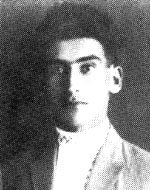Wersha (Warshawski), Levi (Levok)
Son of Rachel (Helena) and Abraham. Born in 1902 in the town of Zdunska Wola, Poland, to a well-to-do family. His father was a leader of the Jewish community and a member of the city council. His mother also dealt with public affairs and in 1906 was received by the Russian heir to Madalya in recognition of her devoted care of the victims of the Russo-Japanese War. Levi had been gifted with wisdom and was especially attracted to painting and sculpture. In 1923 he immigrated to Palestine via Beirut. At first he spent several months in Metula and then moved to the settlement of Menahemia in the Jordan Valley where he worked on tobacco. Then he also invented a machine to turn on the tobacco leaves that would lighten the work. In 1925 he moved to Tel Aviv where he worked as a building sculptor and decorated the facades of houses with sculptures. However, he wished to return to the village life and three years later returned to Menahemia, where he assumed the duties of guarding the place. In a letter to his friend from that period, he wrote at the same time: “At night, I pick roses, my biographical spirit swims, there is a little danger, only along the wall … I am usually ‘fun’ and will probably not leave until after the harvest.” His family abroad did not stop begging him to return to Poland, but he rejected it completely. On the night of the 23rd of Tammuz, 5728 (July 12, 1928), while on guard duty he was killed by Arab thieves. He was twenty-six. He was buried in the cemetery in Menahemia. He left a mother, a father, two sisters and two brothers.
